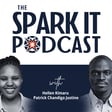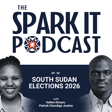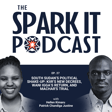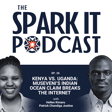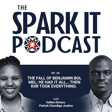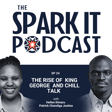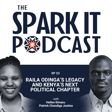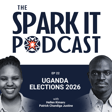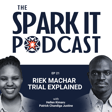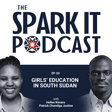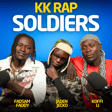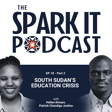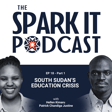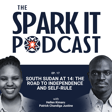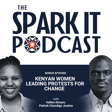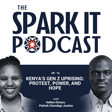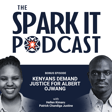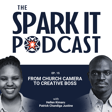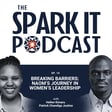Become a Creator today!Start creating today - Share your story with the world!
Start for free
00:00:00
00:00:01

From Refugee Camp to Canada: Emmanuel Taban’s Journey
In this episode of The Spark It Podcast, Emmanuel Taban takes us through his inspiring journey from growing up in a refugee camp in Uganda to earning a scholarship to study in Canada. He shares how he navigated tough choices, overcame self-doubt, and adapted to a new life abroad. From learning English and getting his first smartphone to facing culture shock and adjusting to student life in Canada, Emmanuel’s story is full of courage and lessons. This episode is a must-listen for anyone dreaming of studying abroad or looking for hope, direction, and motivation in their journey.
Transcript
Introduction and Scholarship Aspirations
00:00:01
Kimaru
Welcome to the Spark It podcast where we bring you inspiring conversations that spark your interest to do more. I'm your host Kimaru and I'm joined by two brilliant young men, ah my co-host Patrick CJ and our guest Emmanuel. He was here on a previous episode. I hope you have actually caught up on the episode. It's a searching over after all. You can catch it on all our podcasting platforms and on YouTube.
00:00:26
Kimaru
And on today's topic, we will be diving into a topic that many aspiring students dream about, ah that is winning scholarships, studying abroad, and even settling into a new life in a foreign country.
00:00:39
Kimaru
Anyway, but before we get started, I'll just give the guys ah few sick seconds to say hello to all of you. So yeah. The platform is all yours.
00:00:53
Emmanuel Taban
Hello, Patrick and Kimaru and hello viewers.
00:00:56
Kimaru
hi
00:00:56
Patrick Abure
ah
00:00:58
Emmanuel Taban
Good to have you again. And thanks everyone.
00:01:03
Patrick Abure
Yeah, Emmanuel Taban, very nice to have you on the Spark It podcast once again. i I enjoyed the last conversation we had together and I am very, very enthusiastic about the one of today.
00:01:14
Kimaru
who
00:01:19
Patrick Abure
And I think it's going to be um such a great one. And I know that there are great perspectives that you're going to be sharing in this conversation today.
00:01:30
Patrick Abure
And I can't wait to get inspired and there also for our listeners to get inspired. Yeah.
00:01:39
Emmanuel Taban
Thanks.
00:01:40
Kimaru
All right, so Emmanuel successfully secured a scholarship to study in Canada, and I think this is actually everyone's dream, especially if you're from Africa. We all dream about maybe studying a abroad, whether it be for our undergraduate studies or masters or something like that, because I believe it kind of opens opportunities for us.
00:02:00
Kimaru
So we will allow Emmanuel to give us more insights into his journey and how that has ah sort of looked like. So Emmanuel, thank you for actually gracing this ah podcast once again. It's amazing for you to make time. I know you are a very busy person, but thank you for honoring the invite.
00:02:21
Kimaru
And I guess it's more, um as Patrick said, you will be focusing on your journey from now, from Uganda to going to Canada for further studies. So maybe you can let us know how life was like for you ah after leaving the refugee camp and what gave you sort of the courage to to start applying for scholarships what were some of the steps you took in your scholarship search and what worked and didn't work we could probably just get started from there
00:02:51
Emmanuel Taban
Cool. Yeah. um I'm happy to be back on the podcast and yeah, um ah from picking it up from our previous podcast, um you know, ah I told you initially that um in 2019, I completed my advanced secondary level.
00:03:02
Kimaru
mm-hmm
00:03:14
Emmanuel Taban
And i did I completed it in Bidi Bidi refugee settlement. That's where my uncle was living. So um after my final examination in 2019, so I moved back to Rhino refugee settlement, which which is in Arrua.
00:03:32
Emmanuel Taban
ah But I think it's now under some place called Madiokolo, terrible like that, not Arrua now. So I moved back and I, in 2019, came for the festive season with my family. And yeah, because that's where I initially lived. So I had to come back and rejoin my family.
00:03:50
Emmanuel Taban
So when I returned from Bidi Bidi, I realized that... There are some friends of mine who were Rhino who we actually completed South Sudan's certificate of secondary education together and others even completed before me.
00:04:06
Emmanuel Taban
Most of these guys, they secured scholarship within Uganda and they were in already these top universities. So, and and for me, I i i had already my South Sudan certificate and my...
00:04:13
Kimaru
Thank you.
00:04:20
Emmanuel Taban
And also I just completed my advanced level. So I was so much interested in also looking for scholarship. So i was like, if these guys can get the scholarship using these South Sudan certificate of secondary education,
00:04:37
Emmanuel Taban
why not me who has completed the South Sudan, uh, secondary, I mean, certificate of secondary education and as well as just completed my advanced level. So that means like, so, so like what really gave me the courage to start looking for the scholars, it was just a very simple, uh, uh, and powerful realization that like if others could do it, so why not me?
00:05:00
Emmanuel Taban
So I, I, I asked myself that question. And for that reason, result you know, uh, because, uh, there were not so many, oh I mean, like access to information in the refugee camp was a little bit like really limited, you know. ah Information was mainly in the in the base camp.
00:05:19
Emmanuel Taban
So the base camp is where most of the ah organizations, the humanitarian organization offices are based and the one of the, because the refugees are in Uganda, they're under the ah the office of the prime minister and also, so the base camp is where, you know,
00:05:20
Patrick Abure
you
00:05:36
Emmanuel Taban
most of the the NGOs, the offices are based and and yeah so that's where also people rely on for information.
The Role of Technology in Securing Scholarships
00:05:44
Emmanuel Taban
So on that note, one of the steps that i I did was one, I wanted to get myself a smartphone because I just completed school and I didn't really have the chance to get a smartphone that I could access information freely but also communicate to my friends.
00:06:01
Emmanuel Taban
So there was a day they i I went to the base camp and it was just like for, I went to look for information and maybe some job postings as well. So I went there and i got some job posting.
00:06:16
Emmanuel Taban
I applied for it and after some months I succeeded. And I remember in my first, when we were going for the orientation of that job. so we went and spent like five days in a rua and they did some training for us as well so the money they gave us during that that training i i bought a smartphone like i think that was the that's the most expensive item ah ever bought for my life in 2019 a smartphone i think it was like around 360 000 ugandan slings which is like yeah equivalent of a hundred dollar so and that was that was the start so when i got my phone
00:06:44
Kimaru
Mm-hmm.
00:06:51
Emmanuel Taban
I now have access to information and all those sorts of stuff. So mentally what what motivated me, what encouraged me to apply, to start looking for scholarship is just like the realization that there are people who came after me all who have what I already have,
00:07:11
Emmanuel Taban
succeeded in getting elections so i i just more of posting that questions why not me i became so much curious but also i reminded myself that you know the importance of education especially going into university level i and i reminded myself that you know it's just not about me but it's it's about like breaking a cycle right i i feel like there's not many people really from my family have gone to that level so i feel like that is something that i really needed to do and just break that cycle.
00:07:39
Kimaru
Mm-hmm.
00:07:40
Emmanuel Taban
right So that was where I picked my courage. yeah
00:07:46
Kimaru
Oh, wow. That's really nice. I can't imagine ah ah how much of a difference access to information actually does make. So I believe you ah applied to the student refugee program.
00:07:58
Kimaru
How specifically did you hear about this program and what exactly made you apply? Was it like the packs that come with that sort of ah program or what was so enticing about this particular program?
00:08:13
Emmanuel Taban
Oh yeah, um you know, in the refugee camp, there are really so many scholarships that always comes every year.
00:08:17
Kimaru
Mm-hmm. Mm-hmm.
00:08:20
Emmanuel Taban
And one of the scholarships that so many refugee students rely on is one called DAFI. So DAFI, it's it'ss implemented by, administered by Window, international uganda window Uganda, so they do that And when I returned from Bidi Bidi, from where I had my final exam for advanced secondary level, there's this guy, ah friend of mine.
00:08:45
Emmanuel Taban
I just met him in the Rhino refugee settlement the previous years. And when I came back, I realized that this guy got himself a scholarship and he was already studying in one of the universities in Kampala.
00:08:58
Emmanuel Taban
So ah when I returned, he came for holidays as well during Christmas season. And he told me that there is this quality called SRP, like a kind of sponsorship kind of thing.
00:09:11
Emmanuel Taban
But I really didn't have much information about that. I really didn't have much information about it. So I started started looking at it in my, I mean, using my phone, I started talking and it was, it was, he encouraged me to try it out, like,
00:09:24
Emmanuel Taban
I started searching about it, but I feel there was really a lot of information gap there that was existing. was missing a lot of information about
Navigating Scholarship Requirements and Application Process
00:09:32
Emmanuel Taban
these programs. So what I did, had to go to the base camp again and go and meet some of the staff for Window International.
00:09:38
Emmanuel Taban
So they had to, they really gave me so much information in detail about this program. ah ah The SRP program, how it works and and where it's are they taking the potential candidates who succeed in this. So I started getting so much information about the SRP program.
00:09:58
Emmanuel Taban
and i' it' And the SRP program, it's mainly, um it's it's called Student Refugee Program, administered by ah Canadian nonprofit organization called World Unified Service of Canada.
00:09:58
Kimaru
Mm-hmm. Mm-hmm.
00:10:11
Emmanuel Taban
where the ideal of the program is that it's a very special program that sponsors students abroad to Canada for education, a one-year education, but also creates a pathway for resettlement.
00:10:26
Emmanuel Taban
So like if you are person who who goes through the process and you you succeed, so you will be brought to Canada and you'll be sponsored for a whole year.
00:10:37
Emmanuel Taban
And in that one year,
00:10:37
Kimaru
Mm-hmm.
00:10:39
Emmanuel Taban
you are catered for all your expenses, your housing, your t-zone, your health, and your living allowances are provided. And also ah you get into Canada as a permanent resident. So a permanent resident is an equivalent of a green card holder of the US, I think, where you enjoy almost every privileges you you just There's no big differences between a permanent resident and hold status holder and a citizen.
00:11:09
Emmanuel Taban
So that program seeks to advance refugee students in education, but also creates a platform where it resettles them in Canada.
00:11:09
Kimaru
Oh
00:11:19
Emmanuel Taban
So the program supports you for one year, but in other universities that have like much resources, they will they will take they will take care of you, your tuition for the rest of your program.
00:11:30
Emmanuel Taban
yeah
00:11:31
Kimaru
wow, that's a really holistic program. Interesting.
00:11:34
Emmanuel Taban
Right. Right.
00:11:37
Kimaru
Interesting. So, and what do you need to qualify, especially, i i believe like a lot of um scholarships, there's like the academic, ah whatever, qualifications that are so specific for you to get in.
00:11:46
Emmanuel Taban
but
00:11:51
Kimaru
Is it like really strict for this particular program?
00:11:55
Emmanuel Taban
Oh yeah, i just like any other scholarship, the SRP program had some requirements that you have to meet.
00:11:59
Kimaru
Mm-hmm.
00:12:02
Emmanuel Taban
And one of them is ah the academic one. If you are someone who ah studied in Southend, because like the program is a kind of comprehensive, like it they they know very well that the kind of people who are going to be beneficiaries of this program, these are people who probably have studied in different countries.
00:12:13
Kimaru
Mm-hmm. Mm-hmm.
00:12:20
Emmanuel Taban
So they have a different grades that you should have attained for you to qualify. For instance, if you set the South Sudan certificate of secondary education, you should have from 65% above, I think,
00:12:34
Emmanuel Taban
And then when you did the South, ah you got an advanced USCE, you should have like around 13 points, something of that kind. Yeah, but for my case, i because I already had my...
00:12:49
Emmanuel Taban
my South Sudan certificate of secondary education and I just completed my advanced level, but I didn't have ah the transcript that I would use for this program. So what I did, I used my previous ah credential, like the one I did for the one for 2016 from South Sudan.
00:13:05
Emmanuel Taban
So I applied using my South Sudan certificate of secondary education.
00:13:06
Kimaru
Mm-hmm. Mm-hmm.
00:13:09
Emmanuel Taban
And one of the requirements is one, of course, the grades you should have 65 above, which I had it. And also, you should have a very, very, oh ah very, a story that really ah catches those people, makes them believe that you need you you really dis deserve that.
00:13:29
Emmanuel Taban
So in in the process of in in the application process, there is that provision where you have to write really that moment, that spark of the move that you took from from South Sudan to Uganda.
00:13:41
Emmanuel Taban
you know and And that's one thing that... And that that was also there. And one of the other requirements was also you should be a refugee, right? should have the refugee status, have your refugee ID or an artist station card.
00:13:54
Emmanuel Taban
And also you should have some references from maybe you your community leaders. Those are some of the requirements there.
00:14:03
Kimaru
All right. There's something you say.
00:14:04
Patrick Abure
Uh...
00:14:05
Kimaru
Sorry. I just, I,
00:14:05
Emmanuel Taban
Right.
00:14:06
Patrick Abure
No, I...
00:14:12
Patrick Abure
So, yeah, I wanted to follow up on something that Emmanuel said. ah
00:14:20
Emmanuel Taban
Yeah,
00:14:21
Patrick Abure
Because like Emmanuel, I have also lived in the refugee settlement. um I know how difficult it is to be able to move from one village or settlement to another.
00:14:37
Patrick Abure
And for you, you were living in Bidi Bidi and you had to travel to the base camp. I presume this was maybe in Rhino or was it in Bidi Bidi?
00:14:47
Emmanuel Taban
that was in Rhino.
00:14:49
Patrick Abure
In Rhino.
00:14:50
Kimaru
Hello.
00:14:50
Patrick Abure
Now, that's a long distance.
00:14:51
Emmanuel Taban
Right.
00:14:53
Patrick Abure
and And most often, of course, people do not have the means of transport. You probably need to be able to book ah public means of transport that can be able to take you there.
00:15:05
Patrick Abure
um which in most cases is like a barrier in terms of people being able to go there and access this kind of information like you did.
00:15:11
Emmanuel Taban
but
00:15:15
Patrick Abure
And another thing is really the i issue of the phone. And um I am really glad you started with that.
00:15:23
Kimaru
Thank you.
00:15:27
Patrick Abure
Because I feel like the issue of the phone is one of those things that People tend to ignore, but it's very, very critical with regard to access to information.
00:15:39
Emmanuel Taban
That's true.
00:15:41
Emmanuel Taban
ah
00:15:42
Patrick Abure
I personally can testify to that. And, but it's always, it's probably difficult to get. And in some cases where it's not difficult to get um people, maybe the parents might not be able to allow you, for example, to use it in some cases and stuff like that.
00:16:03
Patrick Abure
And I'm just wondering, like for you, how were you maneuvering all things? difficulties because all I see like these, these are barriers that basically keep many people from accessing this important information.
00:16:19
Emmanuel Taban
Right. Yeah.
00:16:19
Patrick Abure
Yeah.
00:16:21
Emmanuel Taban
You know, regarding the, oh when when I got the phone, because really I didn't have that much money that I would, I just completed my my ah my my secondary school.
00:16:33
Emmanuel Taban
and and But I had one thing in my mind when I was finishing my advanced level is that I will go back to Rhino and at least find something to do.
00:16:45
Emmanuel Taban
Right. That was there in my mind.
00:16:46
Kimaru
Mm-hmm.
00:16:47
Emmanuel Taban
That was, I had that in my mind. And you know, the most interesting thing when I returned from Rhino Camp, by the way, um
Overcoming Barriers with Technology
00:16:54
Emmanuel Taban
because i that's when I realized that you, when you're when you really determined to do something, you're really going to do it.
00:17:01
Emmanuel Taban
So when I returned, how I got my phone, it was, So exciting one. And and and um there's an organization called, um it's it's called the Northern northern northern Uganda Resilient Initiative, NURI.
00:17:16
Emmanuel Taban
i know if you might know NURI. So NURI, when I completed, in 2019, NURI had up a project, I think, funded by some some government here in the West.
00:17:17
Patrick Abure
Yeah.
00:17:26
Emmanuel Taban
and And what they do is that they were seeking for around 25 community-based trainers who would form, you community groups and train them on financial literacy, things to do with budgeting and saving groups, like basically the village saving and loan groups.
00:17:43
Emmanuel Taban
So they were looking for 25 people like to do that. And the Adivats were everywhere, in the refugee camp, in Aruwa. So so So many people applied for that job.
00:17:55
Emmanuel Taban
And I just came out from like from my school. I didn't even have like no work experience or just nothing. I came out like that. So I applied for that. And I heard from the the the guy later on, our coordinator, that there are actually over 500 people who applied for that job.
00:18:14
Emmanuel Taban
for for that job And they only needed 25 people.
00:18:17
Kimaru
well
00:18:17
Emmanuel Taban
So when they do the sort listing, we are like ah about 102 people who are sort listed. And then they told us to go for interviews in Arua.
00:18:30
Emmanuel Taban
you know So we went to the office of... ah ah Because because because za Nuri was... i think they were doing that program with another called Aruha. Aruha is like Aruha District Farmers Association, something of that kind.
00:18:43
Emmanuel Taban
So we went to Aruha office in Aruha. My brother took me because he had like a bike. So he took me from Rhino Calming to Aruha. So when I reached to the scene where the interviews were done,
00:18:55
Emmanuel Taban
I saw so many people, like many, many people. And most of them are big people, like really big. i like i I even asked myself, what am I doing here?
00:19:06
Emmanuel Taban
Like, what am I? Because I could see my myself like failing.
00:19:07
Kimaru
Mm-hmm.
00:19:10
Emmanuel Taban
I just said, like, maybe I'm just coming, I'm coming to try this, but I i saw that nothing is going to come out of this. Over 100 people coming from the same position and I've just completed my secondary school, no work experience.
00:19:18
Kimaru
Mm-hmm.
00:19:24
Emmanuel Taban
And these are people who have like, some of them have like degree holders. So we went for the for the interviews and ah we there were some panels set. And then after the interviews,
00:19:38
Emmanuel Taban
um they it was my turn. They went and they interviewed me, the panel interviewed me and I did my interview very well and I left. So my my brother came and picked me back i mean picked me up and then we went back to Rhein-Lukam.
00:19:53
Emmanuel Taban
And then after one week, one week or so, um there's what we call ah the refugee, the RWC one, it's an equivalent of an LC, a local, I mean, a chairperson in Uganda. So, um because i I gave him as my reference. So there was an evening when I was just sitting home.
00:20:14
Emmanuel Taban
ah That person came to our home and then he asked for me that, where is Emmanuel? And then my mom told me I went to play soccer. It was in the evening. So when I came back, uh, when I, when I came back from the soccer, uh, the guy told me to go to his home.
00:20:30
Emmanuel Taban
he He told my mom that if I come back, I should go to his home. So I returned from soccer. I took showers. So I went to his home. And then what he told me, he said, I got a call from Arua that, um,
00:20:42
Emmanuel Taban
among the people who did the interviews, you emerged the best, like at the top out of 102 people. i was like, what?
00:20:49
Patrick Abure
Wow.
00:20:50
Kimaru
Wow.
00:20:52
Emmanuel Taban
i was like, what?
00:20:52
Kimaru
That's amazing.
00:20:54
Emmanuel Taban
That you emerged the best. And these people are so much proud of you. And they wanted you to go to Arua for training. So I was like, I didn't believe it. So even when i went for it when we went for the training in Arua, yeah like after three days, we went for the training in Arua, like those people, they saw me and they're like, is this the boy? Like this is the guy. They saw me and they were really surprised.
00:21:19
Emmanuel Taban
It was like, they were so much happier.
00:21:19
Kimaru
it
00:21:21
Emmanuel Taban
And from there, I became so much excited. And I had like the money that we got from that training because they would give us their around $50,000 per day for training. And I had some $100,000. I added on and I bought my phone.
00:21:34
Emmanuel Taban
But I never wanted to tell my mom that I bought that phone like with $100,000. I mean, $360,000 because my mom would be mad. Why would you spend this money on this thing?
00:21:44
Kimaru
Mm-hmm.
00:21:44
Emmanuel Taban
I never wanted to her. But I know the importance of having a phone at that moment. but i needed I needed that phone desperately because I really i was at a stage where i I needed access to information and just know things that are happening.
00:21:49
Kimaru
who
00:22:00
Emmanuel Taban
So i it was the the commitment that I made at first when I was leaving school that when I get home, I need to find something to do. You know, i that that determination alone, I think, was made me able to overcome those barriers. So I was determined.
00:22:16
Emmanuel Taban
I had it in my plan. And I was like, no matter what, I have to find something to do when I get back to Rhino. and And that was the thing that really opened waste for me and I had that phone. and And even when I started the application process for this policy, most of the emails were sent to me and they received me using my phone. And I was just wondering if I had no if i did not have that phone, I was wondering about where i was going to get all that information back. Sometimes I could have like meeting on Zoom and do a lot of stuff using my phone. And that is really, really very important. That is one thing that people should do.
00:22:50
Emmanuel Taban
I know nowadays people use their phone for different reasons, but our phones can act as a primary
Seizing Opportunities and Cultural Adaptation
00:22:59
Emmanuel Taban
ah step towards our success if we use them rightly.
00:22:59
Kimaru
Thank you.
00:23:02
Emmanuel Taban
Our phones can break so many barriers and like we can just use them and we can achieve the things that we plan. Very important. Yeah.
00:23:13
Patrick Abure
ah That is very impressive.
00:23:16
Emmanuel Taban
yeah
00:23:16
Patrick Abure
And the I think in addition to that, i i totally agree with what you said. If you use it rightly, it can be a step for your success. And I can testify like to that because our initial proposals at SES Uganda, I wrote them using my phone.
00:23:38
Emmanuel Taban
but
00:23:38
Patrick Abure
Yeah, and it to it was good. It worked. um I think for me, listening to what you've been saying, I see the value of taking advantage of opportunities as they come.
00:23:53
Kimaru
Mm-hmm.
00:23:56
Patrick Abure
Whether we think that we are qualified for it fully or maybe not.
00:23:57
Emmanuel Taban
Right.
00:24:02
Patrick Abure
We just need to take advantage of them because you never know where it might take you next.
00:24:09
Emmanuel Taban
Right. Right.
00:24:09
Patrick Abure
You see, you just come out of school, no experience. You see a job advert. You forget you don't have those experiences, although you've thought like you don't have it, but do you still apply.
00:24:23
Emmanuel Taban
but
00:24:23
Patrick Abure
And you ended up having it.
00:24:26
Patrick Abure
To give the job to you.
00:24:29
Emmanuel Taban
go
00:24:32
Patrick Abure
That is very impressive.
00:24:32
Emmanuel Taban
Yeah, that was us really, really so exciting.
00:24:34
Emmanuel Taban
and and And I think from that that from that moment, i I really, I learned so much from that time. I was like, I think there is no reason for me to limit it myself.
00:24:42
Patrick Abure
Mm-hmm.
00:24:42
Kimaru
Mm-hmm.
00:24:45
Emmanuel Taban
If you get a chance, if you feel you're not qualified, just just go for it. Go for it and and see where it's going to take you. So from that moment, even when the scholarships came out, like I didn't ask myself so many questions. I didn't even look into the requirements. If you were have it, I was just looking at the basics. So was like, if I have this, the one that I can start with, well, and good I started getting into And that's all.
00:25:09
Emmanuel Taban
It really changed my mentality. It changed. That moment changed my mentality so much.
00:25:14
Patrick Abure
Wow. da That is really good, honestly. And I think I agree with you. Like, if there is an opportunity and you are interested in it, give it a shot.
00:25:28
Patrick Abure
You never know. You you might win it. It might to be what ends up changing your life.
00:25:32
Emmanuel Taban
That's true.
00:25:35
Emmanuel Taban
That's true, yeah. Cool. All right.
00:25:37
Patrick Abure
Yeah. Yeah. So, like,
00:25:41
Patrick Abure
For you, in this case, what happened is that the job that you got provided the preparation for you to be able to apply for the student refugee program.
00:25:56
Emmanuel Taban
That's totally right. Yeah, that's that's true. because i i Because like in a month, I could ah could save some money and and also you know just use the money. Sometimes we ask you to go maybe to Kampala, go and do the process.
00:26:11
Emmanuel Taban
and And even when these people would refund us money at some point, so I had to get some money first to use use it like for going and then they would refund it later. so That was really a very important, very, very important. you know Sometimes there are opportunities that really comes, but you also need some resources at at start. If you want to win those things, you need some some money to do it, right?
00:26:31
Emmanuel Taban
So that job really, my first job helped me a lot. The one I had after coming out of school, it I know it was something, I just i was getting something little, but it helped me support my family little and also helped me gotten into the process of the scholarship. It really fascinat facilitated the scholarship process.
00:26:52
Emmanuel Taban
Yeah.
00:26:54
Patrick Abure
Wow, that is impressive.
00:26:56
Emmanuel Taban
Yeah.
00:26:57
Patrick Abure
So for you, ah what was the definitive moment when you realized that, yes, this is my type of opportunity. I really want to give it a shot.
00:27:13
Patrick Abure
Like, what was that motivator for you?
00:27:16
Emmanuel Taban
i know, because like me, honestly, um i I never had in mind that um I want to leave Africa under and then just go and study abroad, right?
00:27:27
Kimaru
Mm-hmm.
00:27:28
Emmanuel Taban
it it was I never imagined myself studying abroad. mind Like if you tell me maybe 10 years ago that maybe at some point you go and study abroad, that would be a very big joke to me.
00:27:39
Emmanuel Taban
and And like, I and never had that in mind. But it's just just like you said, that it's just good to to try out opportunities.
00:27:51
Emmanuel Taban
So what i what I did when this SROP sponsorship i mean sponsor came out is that and just I just tried out my luck. And then i was like, I never intended, like intentionally, I never wanted like to, I never applied, I never approached it with the intention of going through it.
00:28:10
Emmanuel Taban
But was just I was just trying it because I heard that there are people who who went through this process to Canada and some of them even I i ah related to some person who is close to me at home.
00:28:17
Kimaru
Mm-hmm.
00:28:23
Emmanuel Taban
And they just told me, oh, this person has gone through. Maybe you can also try your luck. But when i the moment where I realized like I could go really through this is when I looked into detail, the requirements.
00:28:35
Emmanuel Taban
Because they were asking for 65% when you have South Sudan's certificate of secondary education. And I had so much above that.
00:28:47
Emmanuel Taban
So I was like, what? Let me try this out. Let me try this out. and me try this
00:28:52
Kimaru
Peace out.
00:28:52
Emmanuel Taban
So I just, I went, when I initially told you I went to the to the base camp and they gave me information about the scholarship and i came back home to mobilize my documents and all the requirements.
00:29:05
Emmanuel Taban
And then when I was ready, I went back to them. They helped me through the process. I crafted my story. And and one thing that I'm happy is that, you know, the biggest step was that helped me in in crafting this story about myself that was needed in the application process was ah my writing skills, right? i involved I was so much engaged in writing when I was in high school.
00:29:31
Emmanuel Taban
So I write a lot when I was in high school. and
00:29:33
Kimaru
Thank you.
00:29:34
Emmanuel Taban
i right I was member of the Readers' Club, as I said before, Readers' and Writers' Club. So we write stories. We could participate in essay writing competitions, which really, really, I believed, ah had actually shaped my writing skills.
00:29:51
Emmanuel Taban
So when I came back and during the application process, I feel that skill helped me so much. And, you know, when I submitted my my applications and then after like a month or so,
00:30:04
Emmanuel Taban
I got ah sort listed for the first phase, because there are so many phases in these, like there's a phase where you first get listed and then you get to English test.
00:30:15
Emmanuel Taban
And then there's another one where you go to the IELTS, the International English Language Test Systems and all of these. So in the first sort list, And then when I was solicited and then they say that you are true to the next state.
00:30:29
Emmanuel Taban
So it happened when I was home, I was just with my uncle, I think who we're trying to, we're working on some something at home like that. And then I just saw an email on my phone that you will congratulate on you through to the next phase.
00:30:42
Emmanuel Taban
So the next thing you have to do is this.
00:30:43
Kimaru
Mm-hmm.
00:30:44
Emmanuel Taban
I saw my uncle and everyone was really, really excited. And I was like, but I was afraid that this is not even the end of the story. So this is still the first step, but there are so many steps that are required of me.
00:30:55
Emmanuel Taban
That's like, yeah, if you can if you if if you you were able to do it the first one, we believe that you're you're going to do it. So they also give me that courage. and And when I see myself going through the processes, I became so much confident.
00:31:08
Emmanuel Taban
I was really confident in that. And that that moment, finally, when I realized i was going, it it was just an exciting moment. Very, very exciting.
00:31:18
Patrick Abure
Wow.
00:31:19
Emmanuel Taban
All right.
00:31:20
Patrick Abure
That's lovely. Yeah. ah I have ah spoken to some people who applied and went through the program and some of them were telling me when they were filling those forms, you know, because they are those forms you need to fill and you need to fill them manually, like with your hand or some of them you can type, I don't know.
00:31:25
Emmanuel Taban
All
00:31:29
Emmanuel Taban
right.
00:31:39
Emmanuel Taban
Right.
00:31:42
Emmanuel Taban
but
00:31:45
Patrick Abure
But Some of them were telling me they had to fill those forms like five times, six times, seven times to be able to get to copy that they could now submit.
00:31:55
Kimaru
Oh, yeah.
00:32:00
Patrick Abure
Like for you, what was the most difficult thing throughout the entire process of applying?
00:32:00
Emmanuel Taban
right
00:32:09
Emmanuel Taban
Yeah, I i think that the most ah difficult part of, ah like in the initial stage of filling the form, I would say I really didn't find so much difficulty in filling the form because I was given the form and then ah I went with it like home just to go through it like what,
00:32:31
Emmanuel Taban
What were the things that were needed? So before even filling the form, I went through it separately, like just going through how would I access these questions? And I was also crafting the story in a different page, like just doing it in a in ah in a draft form before putting it on and on on the real form.
00:32:49
Emmanuel Taban
So i I did that several times.
00:32:50
Kimaru
Mm-hmm.
00:32:52
Emmanuel Taban
I tried to make sure that every information in there is correct and accurate. and and And I think that's that's that's the thing. I gave myself enough time. i wasn't in rush. And and i just I just took it cool. like I was with the form home, like just trying to get familiar with the what it was in the form. and And that that helped me because I took my time.
00:33:12
Emmanuel Taban
And then, yeah, but the the hardest time in the whole process i i I experienced was during now the the language proficiency test.
00:33:24
Emmanuel Taban
that That's when we went to Kampala and did the IELTS, the International English Language Test System, where they were assessing you your language ah proficiency on listening, writing, reading, and and what, and and talking, I think.
00:33:24
Kimaru
Mm-hmm.
00:33:30
Patrick Abure
Yeah, speaking.
00:33:44
Patrick Abure
yeah speaking
00:33:44
Emmanuel Taban
Yeah, and and speaking, yeah.
00:33:46
Emmanuel Taban
But the but the most the most ah ah the most hardest part in that in that test was the listening. Because I think they were, you know, the listening part was so hard for me because, you know, the people that were talking in those audio lines, the accent alone was so hard. So I couldn't really get the words easily.
00:34:10
Emmanuel Taban
and and And I feel that was the the the challenge that I faced in this study. But also, these people were very strict with documents, I would say. you know and They always want the documents you present in the initial stages of the application process have to be ah like have to be kept. That consistency has to be kept.
00:34:31
Emmanuel Taban
If you write your story on the application form and in the real state of the interview where they will ask you face-to-face during interview, you have to tell the same story. The information that you presented on the application form has to be the one that you're going to present to them during the interview when they ask you, can you tell us more about yourself?
00:34:51
Emmanuel Taban
And I feel that consistent, that level of consistency was, some people find it hard to keep, but if you if you were keeping it, I feel it's the most required thing in the whole process.
00:35:05
Emmanuel Taban
the whole story you crafted, how you left your country. on Because they have they always have it in record. Even when they're interviewing you, they're following it up from their form. So they always want you to keep that consistency.
00:35:17
Emmanuel Taban
I remember when when we when we went for our English language test, I mean the IELTS in Kampala, I used my refugee ID to apply for the scholarship. So I submitted my ID.
00:35:31
Emmanuel Taban
But when i when I went to Kampala, I forgot with my ID, home, and instead i went with my art station card you i went with the artist isnka and i remember um uh sally you you know sally sally's was one of the coordinators so we went and we were placed in one of the we went to window uh premises in kampala and they they sat us down trying to find out if we have all the documents so they could use it in in the following day for a test so they realized that i didn't come with my id
00:35:45
Patrick Abure
Yeah.
00:36:04
Emmanuel Taban
And Sally was so mad. She was upset because in her mind, she thought that I was not going to sit for the test. Like they were very strict. She had to go and plead to those people.
00:36:16
Emmanuel Taban
And then she asked me actually to go the first to the examination center because she needed to go and advocate for me, talk to me how I forgot with that. And yeah, I feel, you know, you always have to keep that consistency with your documents, even with the information you have on the application form.
00:36:33
Emmanuel Taban
That level of consistency must be kept if you really want to go through and some people find it hard. But if you are able to go with that, I feel you you don't have to worry about anything. It's a very, very ah simple ah process. Yeah.
00:36:48
Patrick Abure
That is really very um valuable for someone who is planning to apply for the student refugee program because it is still ongoing.
00:36:59
Emmanuel Taban
Right.
00:37:00
Patrick Abure
Yeah, I think the the cohort for, is it 2026, 2027 just closed in March, March 31st.
00:37:06
Kimaru
Thank
00:37:08
Emmanuel Taban
Yeah, in March. Last, but yeah, last March. Right.
00:37:10
Patrick Abure
Yeah. So I think for people who are planning to apply for 2027, 2028, this is really like very valuable advice that they could take advantage of.
00:37:23
Emmanuel Taban
Right.
00:37:25
Emmanuel Taban
Right.
00:37:25
Patrick Abure
So this is such a long process.
00:37:29
Emmanuel Taban
It
Academic and Cultural Challenges in Canada
00:37:30
Emmanuel Taban
Very long.
00:37:30
Patrick Abure
Yeah.
00:37:32
Emmanuel Taban
Very long.
00:37:32
Patrick Abure
So when did you realize that you were finally, finally selected, confirmed?
00:37:42
Emmanuel Taban
I think i think the the final the final ah the the moment I realized I was i went through the process, like I was confirmed, is when I was at the airport, would say.
00:37:58
Kimaru
Oh, wow.
00:38:00
Emmanuel Taban
That's when I was at the airport and that's when I realized that, oh, like it's now happening.
00:38:04
Kimaru
It's happening.
00:38:06
Emmanuel Taban
And finally i I've met it. But even when we were, because because ah after after the whole process, we were taken to Kampala and we went for medicals, like they did a lot of testing. and At that stage, I was still worried because anything could happen and you still be stopped.
00:38:23
Emmanuel Taban
Even COVID, because I remember when we were confined at Grand Global, you know, they took us for COVID tests and there were some of us who were left behind because they were tested COVID positive.
00:38:34
Emmanuel Taban
And, you know, just the the only the the moment that id I I really made it was when I was at the airport. And and that was that was the only time. Because I just like the process was really too low. You you don't even know like which one is the final stage, right?
00:38:50
Emmanuel Taban
Like this comes up to the other and it looks like an eternity, an infinite, i mean, a process.
00:38:50
Patrick Abure
right
00:38:57
Emmanuel Taban
But when I was at the airport, I realized that I was now going to Canada and it's coming to Canada and and the whole thing has now come to an end. Yeah. So the the moment i realized I was confirmed was when I was at the airport, I'll say.
00:39:10
Emmanuel Taban
Yeah.
00:39:10
Patrick Abure
Interesting.
00:39:11
Emmanuel Taban
Right.
00:39:12
Patrick Abure
Yeah. Yeah.
00:39:15
Kimaru
How did it feel though? Being there and even landing.
00:39:17
Emmanuel Taban
Oh, I...
00:39:21
Emmanuel Taban
No, the moment, you know, I i i just like we we left South Sudan and, you know, we left so much, like so many memories back home coming to Uganda, right?
00:39:34
Kimaru
Mm-hmm.
00:39:36
Emmanuel Taban
So that transition from South Sudan to Uganda, that was an emotional moment because I initially told you we left so much home, not as an individual, but as a family, we left so many things but that we really started like we were at some point And then when we were coming to Uganda, everything just was left be behind, memories or friends. and And when we were in Uganda, we tried to build life again, you know coming from from from zero to something else, making new friends.
00:40:09
Emmanuel Taban
trying to forge some new memories and and connections, just trying to make ou ourselves attached to being Uganda, feeling like a second home. And you know, that moment again of leaving a place you've started in and again you're going to another extremely new place, that is not even kind of related to where you were.
00:40:18
Kimaru
Mm-hmm. Mm-hmm.
00:40:28
Emmanuel Taban
So it it becomes so much like oh scary because you know it's not like just any other African country. This is ah typically a Western country that you people probably have completely different cultures and beliefs and and the weather alone is totally different. So I was nervous at the start because when I remember when we were at the hotel just ah in that transition stage to come here, my friends ah like so, I don't know, they were just like, I think trying to
00:41:01
Emmanuel Taban
create some fun of me. Because the part of Canada that I'm in right now is extremely cold, in the extreme north. And here, like, it's really, really cold. It goes to minus 40, 44, something like that.
00:41:14
Emmanuel Taban
So I remember when they were telling me, man, you're going to go to the Yukon and you're not going to see the sun for the whole year. you know, and those moments, like, they look scary, right?
00:41:22
Kimaru
Mm-hmm.
00:41:25
Emmanuel Taban
So it was scary, but I also feel excited because I feel like
00:41:25
Kimaru
who
00:41:29
Emmanuel Taban
this is an opportunity that i'm going to to use to create difference not in my life only but for my family and and and hopefully for my entire country you know education is a very important thing to to anyone else access to it very very important when you become a learned person you don't only become beneficial to your own self or your family but you become a national resource you become of a benefit to the entire country so whereas i was kind of a scared to live
00:41:53
Kimaru
Thank
00:41:59
Emmanuel Taban
Uganda, coming to Canada, I was also taking it as an opportunity to change myself, to change my family, but also change my country in the future. So I had that in mind. These two conflicting moments were there. But of course, at the end of the day, I have to come to a realization that this is a necessary thing that I have to do.
00:42:17
Emmanuel Taban
If I want change, I will not just stay there back home and and and do nothing. I have to look for this opportunity, to grab it, go and change life. So so that moment alone just feel scary, but exciting at the same time.
00:42:33
Emmanuel Taban
Yeah. Right.
00:42:35
Patrick Abure
wow
00:42:35
Kimaru
I like the way he's talked about um the aspect of, you know, that thing that was giving him a push.
00:42:42
Kimaru
You have a story. You want to change this story. You want to change your life. You want to change the life of your family, your community, and all that. So that kind of set you on a path where it doesn't matter whether you're going to Yukon and it's the coldest.
00:42:58
Emmanuel Taban
Yeah.
00:42:59
Kimaru
Yeah, that's a big sacrifice.
00:42:59
Patrick Abure
I remember i was i was telling him to get for us land in Yukon.
00:43:01
Kimaru
Mm-hmm.
00:43:03
Emmanuel Taban
Yeah. Really so bad.
00:43:07
Patrick Abure
but
00:43:08
Kimaru
Is it affordable?
00:43:10
Emmanuel Taban
yeah but here
00:43:15
Kimaru
I can weather them can imagine the way East Africa is a bit warm, the weather is actually very friendly and then going to a place that is actually very extreme, I can only imagine how bad it can be.
00:43:15
Emmanuel Taban
it's
00:43:25
Emmanuel Taban
yeah liava
00:43:27
Kimaru
Okay.
00:43:28
Emmanuel Taban
yeah
00:43:29
Kimaru
So, ah for example, when you got there, of course, you enrolled in school. how What were it like your first impressions of university life in Canada? How the education system is in comparison to what you are you are used to, whether it's be it in South Sudan or in Uganda?
00:43:47
Emmanuel Taban
be I think um back home in in in both countries, um Uganda and South Sudan, I have a feeling that, you know,
00:43:52
Kimaru
Mm-hmm.
00:43:56
Emmanuel Taban
And there's no debate about it, but really, honestly, like in South Sudan, I think majority of of people maybe watching this will would agree with me that our education system really needs a lot.
00:44:12
Emmanuel Taban
Our education system needs a lot. n And i realized that um in both countries, in Uganda and South Sudan,
00:44:21
Kimaru
Mm-hmm. Mm-hmm.
00:44:21
Emmanuel Taban
education system mainly focus on on just ah passing examinations and and and memorization, right? Like all their concern is they just want you to pass exam and they don't care what it takes. If you're cramming it, all you need to do is just memorize what you have learned in class, you know?
00:44:39
Emmanuel Taban
But one thing I found different here is that when I landed here and I got into the Canadian education system, it deeply focused on one, especially the programs that I'm doing, focusing on research, writing, you know, on, I mean, and and analyzing, you need to analyze some material, you need to critique it and and just come up also with your own opinion. you know it gives you that opportunity to broaden your mind.
00:45:09
Emmanuel Taban
You don't only become a person who is interested in passing examination, but you become a critical thinker. So you you when you look at the material, for instance, you will be expected to go through this material not just for the sake of passing, but you'll be asked to read it, analyze it, and critique that that material and also give your personal opinion about it.
00:45:19
Patrick Abure
you
00:45:19
Kimaru
Mm-hmm. Mm-hmm.
00:45:32
Emmanuel Taban
right So I feel that you know these are all processes that makes you your mind great. You become a critical thinker. you you you Instead of just focusing on passing a examination,
00:45:44
Emmanuel Taban
like you you you become more than that. And if you have that in mind, it becomes so easy for you just to pass examination.
Support Systems for Refugee Students
00:45:52
Emmanuel Taban
you know and and And these are the two differences.
00:45:55
Emmanuel Taban
Education system back home focuses mainly on passing exams and memorization, but here there's so much based on research and critical thinking. And that's the one difference that I've noticed about the education system here.
00:46:09
Emmanuel Taban
yeah
00:46:11
Kimaru
Yeah, i would say what you said is almost the same for Kenya too. it's ah It's more about like passing exams, sometimes even memorizing a lot. That happens a lot even here.
00:46:19
Patrick Abure
you
00:46:21
Kimaru
I think right now what they're trying to introduce, the competency-based curriculum, would definitely change that because they don't do grading.
00:46:29
Emmanuel Taban
Right.
00:46:29
Kimaru
It's like more of, ah they say, I don't know, surpassed expectations. That's the way they grade it. So...
00:46:35
Emmanuel Taban
Right.
00:46:36
Kimaru
I think now it's going to be different in a couple of years. But I went through that scenario of you memorize and memorize.
00:46:44
Kimaru
going to be the best. But, yeah, I see what you mean.
00:46:44
Emmanuel Taban
Right.
00:46:46
Emmanuel Taban
Mm-hmm. but
00:46:49
Patrick Abure
i I have a quick question for you.
00:46:51
Emmanuel Taban
right
00:46:52
Patrick Abure
um So you leave Uganda, you come to Canada and you join Yukon University um studying indigenous governance.
00:47:02
Emmanuel Taban
Right. Mm-hmm.
00:47:08
Patrick Abure
What were some of your biggest cultural shock like and and maybe academic challenges when you started you know schooling at Yukon University?
00:47:18
Kimaru
Mm-hmm.
00:47:21
Emmanuel Taban
Yeah, um you know, concerning academic challenge that I faced was one, you know, when when I was back home, I just, ah when i when i when I was doing my advanced secondary level,
00:47:35
Emmanuel Taban
you know, we were focusing on writing, like when we were doing our exams, they needed you to write an essay, answer questions in an as essay form. But those those things like, you know, you you you don't have to cite anything you're writing, right?
00:47:49
Emmanuel Taban
You just have to write whatever information, if you're getting it from anyone, you don't have to give credit to that person. But the the first academic challenge that I had here was when I came and I was writing um I was like writing response to to the questions and they were expecting me to cite all the information that I i was i was writing. right If you get it from another place, you have to keep to give credit to the source.
00:48:11
Kimaru
Mm-hmm. Mm-hmm.
00:48:15
Emmanuel Taban
but and and i thought That was the first thing because i was not familiar with the site. min like no the citation styles. So that was one of the biggest challenges that I i really faced because I had to go through all the the the the ah the rules for the citation style. How do you cite information?
00:48:36
Emmanuel Taban
Like if you want to paraphrase, maybe if you want the record, if you want to do it, how do you do it? So that was one of the biggest challenges I faced in my and and my five stop first I would say. And I also had issues with our with a maybe just getting familiar with with with the model, the the learning platform.
00:48:57
Emmanuel Taban
But yeah, academically, that was my first challenge. Citation, you have to cite every single ah information. If it is your own, you don't have to cite, but if you're getting it from someone else, you have to cite. And if you don't cite, that information is not going to be relevant. And you might even be penalized for it, right?
00:49:17
Emmanuel Taban
You might be penalized for it. So they might say that is plagiarism and so many stuff. So you have to cite every single information you're writing on your piece. And that was a very, very big blow on me, very big, a punch on the face.
00:49:31
Emmanuel Taban
So I had to commit myself, go familiarize myself with all the the citation styles and i have to stick with one so that's that was the challenge that i had first but in terms of cultural results of course as i say this is completely a different country you know i was coming from a community-based culture where You do things, you like people like community, right?
00:49:58
Emmanuel Taban
You come together, ah you celebrate, you walk on the street, you just go on the street, you see people spreading everywhere.
00:49:58
Kimaru
Mm-hmm. Mm-hmm.
00:50:05
Emmanuel Taban
You can go to your nearest place without even asking them, just get into their house. You don't have to ask a for permission, you do things on your own. and You don't have to ask for appointment to see your friend.
00:50:18
Emmanuel Taban
But when I came here, things are completely different. This is like, I'm a country that is focusing on individualism, right? So mainly people focus on themselves so much and they are closer cycles, you know, and it reaches an extent even where if you want to meet friend, you have to make an appointment.
00:50:29
Kimaru
Mm-hmm.
00:50:38
Emmanuel Taban
You don't just have to walk into their place without letting them know and And everything is just a schedule. Everything is timed. like this this you don't You don't really find that free time. And you can even stay in your room for over five days. And you never even don't know their are names. You might spend five years, but you don't know even the name of your neighbor. like People focus on themselves mainly here.
00:50:59
Kimaru
um
00:51:02
Emmanuel Taban
And which is very, very, I think it teaches a lot as well.
00:51:02
Kimaru
who
00:51:07
Emmanuel Taban
like but but but i feel that was the difference from coming from uh culture i mean a community-based culture to a culture where people focus on uh individualism so that that was the great difference great great great difference yeah
00:51:25
Patrick Abure
ah I think you really offer like the challenge you have cited to do with the citation styles and citing and plagiarism.
00:51:25
Kimaru
home
00:51:30
Kimaru
Thank you.
00:51:36
Emmanuel Taban
yeah
00:51:37
Patrick Abure
I think it's really something that anyone who's planning to come and study in Canada needs to take note of. And even if possible, start familiarizing themselves with citation styles and things like that, because you can easily get a zero.
00:51:59
Emmanuel Taban
Right. Not only get a zero, but also penalize.
00:52:00
Patrick Abure
Yeah. Just. for Oh, yeah.
00:52:00
Kimaru
Oh
00:52:02
Emmanuel Taban
You can even be removed. out they they they They will suspend you from the school. you know Yeah. So these are some of the things they do.
00:52:09
Patrick Abure
Yeah.
00:52:10
Emmanuel Taban
So it's very important. Yeah.
00:52:10
Patrick Abure
Yes. It's very, very important. Yeah. Otherwise you get kicked out and it wouldn't be good.
00:52:16
Emmanuel Taban
Yeah. Right.
00:52:19
Patrick Abure
Yeah.
00:52:20
Emmanuel Taban
Right.
00:52:20
Patrick Abure
and And also i was just like, you know, Andre, I know you talked a little bit about this when you were talking about
Coping with Homesickness and Staying Motivated
00:52:28
Patrick Abure
individualism, like the cultural differences.
00:52:30
Patrick Abure
You know, like back home, when you're walking on the street, random people will say hi to you, whether they know you or they don't know you.
00:52:39
Kimaru
Mm-hmm.
00:52:41
Patrick Abure
They will just say hi to you. That is not here.
00:52:45
Emmanuel Taban
out here.
00:52:45
Patrick Abure
In fact, if someone does that, they are so weird.
00:52:47
Kimaru
Sorry.
00:52:50
Emmanuel Taban
Yeah.
00:52:52
Patrick Abure
and we want What was your reaction?
00:52:53
Emmanuel Taban
So we're, and, and,
00:52:57
Emmanuel Taban
No, you know, the the the the thing here is like, what one of the most weirdest things that I experienced when I first landed is one. I realized that like, really, it's it's hard for people just to say, Hans, you don't really have to say someone's, that just say hi, and that's all, you know?
00:53:10
Emmanuel Taban
And you don't really, it it it becomes so like, people would see you like, I don't know if that looks so much primitive, they will see you like primitive or what, but when When you come and you want to shake the hands of someone, it that really looks so weird.
00:53:25
Emmanuel Taban
you know It looks weird here. You just say hi and that's all. And those are some of the differences that I really noticed. And you can easily be taken maybe for i mean to be someone who is rude or when you do like very small things. you know Just like what Patrick has said, you just have to just go and talk to someone anyhow without, like you don't know that person.
00:53:43
Kimaru
Mm-hmm.
00:53:47
Patrick Abure
Yeah.
00:53:49
Emmanuel Taban
It's considered you're rude.
00:53:49
Kimaru
Mm-hmm.
00:53:51
Emmanuel Taban
You don't have to text someone, like just get into their inbox randomly and just text them. People consider that being rude, honestly. So that's that's that's the big difference.
00:54:00
Kimaru
Mm-hmm.
00:54:01
Emmanuel Taban
you know Back home, you can just text anyone at random. You don't have to be asked. There's nothing wrong. And if you're back home, like If you don't greet people, you don't shake their hands, you're considered to be rude or disrespectful, which is not the case here.
00:54:13
Patrick Abure
yeah
00:54:15
Kimaru
Yes.
00:54:16
Emmanuel Taban
So it's just like the opposite. Yeah. but But yeah, those things happen. and and But one thing ah exciting about these places is that, you know, Canada teaches people to be very polite and respectful. That's one thing that I like about it.
00:54:29
Emmanuel Taban
Especially, um um you know, people would just say thank you over small things. every single day you do something small to just say thank you, thank you, thank you.
00:54:39
Emmanuel Taban
And you at the end of the day, you you see that on average, a Canadian would say thank you maybe in a day, maybe 10 times, 10 and above. Like honestly, you have to say that, especially if you go to gatherings, if you
00:54:51
Kimaru
Oh, wow.
00:54:54
Emmanuel Taban
engage with people in some places you'll have to say thank you at least 10 times a day or more so it teaches people to be very polite you're going into some room you're opening the gate you and someone is coming behind you you have to keep holding that door until the person gets in just exciting yeah teaches you good manners yeah
00:55:12
Patrick Abure
yeah Interesting.
00:55:15
Kimaru
<unk> So in a community like that, ah no, before even ask the question, now that you guys have mentioned about shaking hands, ah during COVID, people could not even believe that you are not allowed to shake hands. It was such an adjustment back here.
00:55:32
Kimaru
So yeah, I guess for Canadians, then it was a bit easier because you know you don't even shake hands in the first place. Anyway, but my question is in such...
00:55:40
Patrick Abure
and And also, just to add on what Emma said, it's not like you totally don't to shake.
00:55:42
Kimaru
had Sorry. Sorry.
00:55:49
Emmanuel Taban
Don't agree. Yeah.
00:55:51
Patrick Abure
Handshake mostly for some reason.
00:55:53
Emmanuel Taban
Yeah.
00:55:53
Patrick Abure
I don't know why it happens in very official settings.
00:55:56
Emmanuel Taban
Right.
00:55:57
Patrick Abure
You know, like...
00:55:57
Patrick Abure
Yeah. Yeah.
00:55:57
Emmanuel Taban
But just at random like that.
00:55:59
Emmanuel Taban
Yeah.
00:56:00
Patrick Abure
Yeah.
00:56:01
Emmanuel Taban
And here people can find you just waving hi and that's all. Right.
00:56:06
Kimaru
sense. But in such ah in in such a like cultural dynamics,
00:56:07
Patrick Abure
yeah
00:56:13
Kimaru
where maybe like people, there's a lot of individualism and all that. How did you like sort of find a support system to help you navigate whether it's like settling down with score school or anything you needed?
00:56:28
Emmanuel Taban
Oh, yeah um as I said, ah the WUSC, there is, in every university that sponsor a refugee student, there is what we call the WUSC Local Committee.
00:56:39
Emmanuel Taban
So a WUSC Local Committee, it's mainly a composition of a former SRP students in that very school, and also faculty members.
00:56:47
Kimaru
Mm-hmm.
00:56:49
Emmanuel Taban
So these people, they help so much. They're the one actually doing, they're really responsive. They facilitat facilitate, they help in in in the transition and integration process.
00:57:01
Emmanuel Taban
So making sure that everything is set up for you, making sure that you have all the necessary documentations, making sure that you have your bank account. Also making sure that in case of any support you need, maybe things to do with health or any psychological support, they can refer you to the necessary people.
00:57:20
Emmanuel Taban
So these these committees are set up in all these universities that sponsor SRFD students.
00:57:22
Kimaru
Mm-hmm.
00:57:26
Emmanuel Taban
So it becomes so easy for new SRFD students to just like just integrate into their community and but simply because these committee these committees are already set up and that is their primary role, to make sure that the student does not go through a lot when in in the process of of of integrating into that very community or the university.
00:57:48
Emmanuel Taban
So these communities help a lot and they really helped me with that. At some point, they feel that maybe I'm feeling lonely in my first year, they would come and take me out, we go for work, go somewhere, just like get that refreshment and that feeling of not being homesick.
00:58:05
Emmanuel Taban
And yeah, they play a very, very crucial role in the whole WUSC SRP program. Yeah.
00:58:13
Kimaru
Wow, that's how amazing.
00:58:17
Patrick Abure
Yeah, that sounds great. Like, i yeah i am interested in knowing if you ever felt like at one point maybe giving up because of maybe like a challenge or a particular situation that you were going through, like something that stood out.
00:58:37
Emmanuel Taban
yeah
00:58:41
Emmanuel Taban
Yeah, there are so many instances really where
00:58:42
Patrick Abure
that made you question your decision of coming to study.
00:58:47
Emmanuel Taban
that's that's the like, you know you know, as humans, you always be faced with a lot of challenges. And one of the biggest challenges that I faced and at some point I felt like giving up is when ah things became so overwhelming, you know.
00:58:55
Kimaru
Mm-hmm. Mm-hmm.
From Journalism to Policy-Making: A Shift in Dreams
00:59:03
Emmanuel Taban
In Canada, almost 100% people who are who study, they they study and work at the same time. So majority of Canadians study and work at the same time.
00:59:16
Emmanuel Taban
You might be studying part-time and then work full-time or work full-time and study part-time. So, and and for my case, I was ah doing like a full-time job and studying full-time as a student as well.
00:59:32
Emmanuel Taban
So, you know, like it really became so overwhelming.
00:59:33
Kimaru
Oh, wow.
00:59:36
Emmanuel Taban
You've just come back from work. You need to do other stuff for yourself. Maybe you need to cook for yourself. You need to do this and that. And also you have to keep with, due dates for your exam you have to do because yeah you have to do weekly writing for every course you're taking every week you have to write you have to read you have to write an assignment you have to submit it and and you have to like respond to students as well because there's some forum online where the student post their their their responses toward the question and then you also interact so at some point it became overwhelmed to an extent where i feel like this is too much for me like it's really too much and
01:00:16
Emmanuel Taban
you know with that with that in mind where i just came back home i left my family that feeling where i feel like if i was with a family this wouldn't be like this you know that homesickness and that overwhelmness from classes and work it was really really so much for me and i i feel like i i need to give up at this point but when i feel like giving up i i also started reminding myself the reason why the original purpose of me
01:00:25
Kimaru
Mm-hmm. Mm-hmm.
01:00:43
Emmanuel Taban
coming here. And i I started recalling those moments when I when i was leaving home for here, you know, that moment when I was with my family that last night we were seated together with them and they were giving me advice and how they were hoping on me.
01:00:58
Emmanuel Taban
ah i And also those people who were living with them who still believe in me, but also my bigger purpose of life where I feel at some point i need to do something beyond my individual life, beyond my family life, but to the greater benefit of maybe my country.
01:01:13
Emmanuel Taban
You know, those moments... When I feel like giving up and I start recalling those moments, I started thinking that if I want to give up at this moment, it's not only giving up on myself, but I mean giving up to those people who believed in me, who were hoping on me.
01:01:28
Emmanuel Taban
It will mean giving up on my family too. So i those words just comforted me. And I said, no matter what is going to happen, I'm just going to do it.
01:01:40
Emmanuel Taban
I'm going to keep it and continue what I'm doing.
01:01:42
Kimaru
Wow.
01:01:44
Emmanuel Taban
Yeah.
01:01:46
Patrick Abure
Wow, that's lovely.
01:01:46
Kimaru
Maybe.
01:01:47
Emmanuel Taban
but
01:01:50
Patrick Abure
Yeah. How about food?
01:01:52
Emmanuel Taban
Oh, man.
01:01:53
Kimaru
thank you mean
01:01:56
Emmanuel Taban
Food was the most annoying thing. I can be in Korea. Actually, when COVID was when covid is in its like in Canada, it was in its serious state in 2021.
01:02:07
Emmanuel Taban
ah People there were there are still the the people were advised to put on masks, no public gatherings. and And most of the classes, by the in my first semester were all online.
01:02:19
Emmanuel Taban
There was no in-person. Only a few classes were in-person.
01:02:20
Kimaru
Ooh.
01:02:22
Emmanuel Taban
So when I came, I was put in quarantine like for 14 days in a hotel when I came to Canada. So they have to look for symptoms of COVID, and they would check on me every single day, every morning.
01:02:33
Emmanuel Taban
think the health department would call me on the hotel phone and check if I had any COVID symptoms and signs, but I would tell them no. And one thing in the hotel, they would just deliver the food and put it at the door, and then go and open, bring it back. So every morning, they bring in the food, like...
01:02:52
Emmanuel Taban
It was strange. like There's nothing that I know. i even have no idea what these things are. I just see something that... But it was completely different. so I would just maybe eat a little and just dump the rest.
01:03:07
Emmanuel Taban
So it was so, but I had a friend of mine who also came as an SRP student. He was a former student. So it was in the campus in the university. And i would tell him like, maybe if you could buy me some fruit, so it would take me in the evening to the hotel. And, you know, I was just surviving on this, like,
01:03:23
Emmanuel Taban
things that I know before. would ask him to buy this and then he would take it to me. But the Canadian food my at the start was very, very, it was strange. Like the taste alone was different.
01:03:36
Emmanuel Taban
It was different. Like, yeah. But with time, i get used I started getting used to And yeah, and finally we're here. Yeah.
01:03:47
Kimaru
Now you are fully adjusted.
01:03:49
Emmanuel Taban
Kind of, yeah. All right.
01:03:52
Kimaru
Oh, wow. Interesting.
01:03:54
Emmanuel Taban
Yes.
01:03:55
Patrick Abure
Yeah, that is definitely such an experience. And I think it's really interesting. If someone who is planning to come study here, listen to this, they will prepare their mind and make sure that, yeah, there are going to be some serious changes that they would have to deal with.
01:04:10
Emmanuel Taban
Well, that sounds right.
01:04:20
Patrick Abure
Yeah. So um what advice do you have for students who might be planning to apply for the student refugee program?
01:04:31
Kimaru
Mm-hmm. Mm-hmm.
01:04:34
Emmanuel Taban
Yeah, um I guess an advice I would give to the student is one. have ah First of all, what they should know is that their current condition should never determine their future, right?
01:04:49
Emmanuel Taban
Like what they need to do is one, look for information, look for help if you need it. That's one thing. It is always good. You know, they say, information is power.
01:05:01
Emmanuel Taban
So if you have access to information, you become well equipped to face anything ahead of you. So if you are planning to get into this program, if you're planning to apply maybe the next for the next cohort, what you should do is, in case of help in the process,
01:05:18
Emmanuel Taban
You need to ask people. We have so many people. you know One thing I've noticed is that these SRP students here in Canada, at you know at some point, I'll just like get random text about someone asking you, hey, you tell me how is the process, how is this done, I want to apply for this SRP.
01:05:34
Emmanuel Taban
And, you know, at the end of the would just like say, oh, it's fine. Let's make an appointment. Let's do this. And I would just like maybe take them through the process. and And this happened. There are so many good people here that have come through this program that are ready to help.
01:05:45
Kimaru
Thank
01:05:47
Emmanuel Taban
So if you are there looking for help, just if there's any one of them that you know is stationed here, reach out to them. What I know is that they are always willing and available to help. No matter who you are, even if they don't know you, one,
01:06:00
Emmanuel Taban
Just get to them, hit the inbox, they will be ready to help you. And just be very, very, very consistent in the process of the application.
01:06:11
Patrick Abure
Thank you.
01:06:13
Emmanuel Taban
Always be consistent and just know that you're going to make it. like You don't have to really doubt yourself. The first step you need to do is just get on and do it, apply for it.
01:06:25
Emmanuel Taban
Rest of the things will happen.
01:06:29
Patrick Abure
Wow, that's an amazing advice.
01:06:32
Emmanuel Taban
Right.
01:06:32
Patrick Abure
Always important to ask for help.
01:06:34
Kimaru
Mm-hmm.
01:06:35
Emmanuel Taban
Right. First, very important.
01:06:36
Kimaru
Mm-hmm.
01:06:36
Patrick Abure
I think that is so important for people to understand.
01:06:39
Emmanuel Taban
Right.
01:06:40
Patrick Abure
um ah So look at you. From South Sudan to Uganda as a refugee, to Canada as a protected refugee, to now a Canadian citizen.
01:06:46
Emmanuel Taban
Right.
01:06:56
Emmanuel Taban
Right.
01:06:58
Patrick Abure
Such a wild ride.
01:07:00
Emmanuel Taban
It is.
01:07:01
Patrick Abure
How does that feel? And what what is the important lesson you have learned in this process that you would want to share with us
01:07:09
Kimaru
Mm-hmm.
01:07:13
Emmanuel Taban
you know, and and that that was still like, that that that I'll go back with the saying we had in the previous episode that everything happens for a reason. You know, that's that's always what i I always say when things happen.
01:07:28
Emmanuel Taban
this You know, um it is, you know, i God forbid, I'm not saying that war should happen in our country, but, you know, when things happen, God always has his own way.
01:07:43
Emmanuel Taban
that is going to let you out of it, right?
01:07:43
Kimaru
Mm-hmm.
01:07:45
Emmanuel Taban
So I believe that it is it is not my that's not my struggle. It is not maybe my efforts that made me to come here. But one, I believe in God, right?
01:07:56
Emmanuel Taban
I believe in God, and I feel that everything that has happened in the entire process, me coming from South Sudan, getting into Uganda, starting there and getting the application process for the SRP and winning it,
01:08:08
Emmanuel Taban
coming to Canada, getting into school and becoming a Canadian, this whole thing, it's this is just God's plan. <unk> and And this really tells us that, you know as I say, that your current conditions should never determine your future.
01:08:25
Emmanuel Taban
i You might be a refugee, you call yourself, but a refugee brings a lot to the table more than what they just come from their country more than what they they they brought from their country they bring to the countries where they come in more than their belongings more than their they are their their spirit more than their they're like those those scary moments there's something special that they bring to every cost community that they go to
01:08:36
Kimaru
Mm-hmm.
01:08:59
Emmanuel Taban
They bring in inspirational stories. They bring in some instances where can be used to create solutions to the world. They bring in their knowledge. They bring in their skills.
01:09:14
Emmanuel Taban
I've seen so many refugees in the world today who have succeeded and they're playing very, very vital role in changing the world. So therefore, what you should know is that if you are a refugee and you should just know that you're more than that, you're more than that status, there's a lot in you that the world is expecting.
01:09:35
Emmanuel Taban
And if you believe in yourself, you're going to be one of the change makers. you know and and And the purpose is that the main reason maybe that God is planning this on you so that you can go and rebuild yourself, equip yourself so you can go back and fix things.
01:09:52
Emmanuel Taban
right So a refugee is just more than status. It is more than that.
01:10:00
Patrick Abure
Thank you very much.
01:10:00
Kimaru
well
01:10:01
Patrick Abure
That's a very good lesson. um So as we wrapped it up and I'll hand over to our co-host Kimaru, ah your experiences coming from South Sudan to Uganda and finally to Canada, where are you're now a citizen.
01:10:24
Patrick Abure
How has these experiences changed ah your dreams and personal goals, but also changed your your dream for South Sudan as a country?
01:10:40
Emmanuel Taban
You know, ah my my experiences have really been, i would say they have changed in the entire process. They have been changing. and And I feel that it's for a reason. You know, when I was back home, when I just completed my secondary school in South Sudan, my initial goal was to go for, my personal, my goal was to go and do journalism, right?
01:11:04
Emmanuel Taban
I really wanted to do journalism. When I got done, And then I came when a war happened, I enrolled for journalism training, of course. And then ah when the war happened in 2016, I left South Sudan for Uganda. stayed in Uganda.
01:11:20
Emmanuel Taban
And when I was in Uganda, i I became so much attached to student leadership. I have a feeling that, you know, you it's It's always good, you can change the world when by creating good narratives through writings and and just reporting or writing the best about your plays and just putting your opinions about how things are supposed to be done.
01:11:45
Emmanuel Taban
But when I came to Uganda, I started thinking that good good to also be part of that, like just to get involved in the process, right? and And that thing needs you to be a leader.
01:11:57
Emmanuel Taban
that's That's one thing I have realized. And therefore, I started committing myself into student leadership simply just to gain in that experience and to get that that passion for leadership. So when I came here to Canada, sorry,
01:12:12
Emmanuel Taban
So when I came here to Canada, I had the passion for journalism, of course, but then um I started looking in a different way. i I feel like there's so much that happens in every country that changes their country. And one, if I can be a journalist, I can be more than that, right?
01:12:34
Emmanuel Taban
I can get into things to do with policies because you know in every country, the things that really changes countries It's not even the leaders that... The leaders really do less.
01:12:46
Emmanuel Taban
But what really makes a country works best is when these countries have effective policies. When you know that you're having an education system that works, that your kids go to school and they get the required knowledge that when they come out of school, they are of relevance to the country.
01:12:59
Kimaru
Mm-hmm.
01:13:06
Emmanuel Taban
You know that there is an e there is a policy on health that... The people in that specific country can go and acquire health services and that their lifespan can keep increasing.
01:13:18
Emmanuel Taban
Policies about housing that people are able to sleep in very good housing, very conducive. It's all about policies. These countries today that are seen as the darlings of the world, it's not that they are perfect. It's only that they have policies that works.
01:13:33
Emmanuel Taban
So when I came to Canada, I started looking so much into getting into policy. That's one thing. So the entire thing has been changing from journalism, left, just like I say, no, this shouldn't be just about writing, but getting into the core of every nation.
01:13:38
Patrick Abure
Thank you.
01:13:48
Emmanuel Taban
What makes a nation great? It's when they have great policies. and And that's what my studies are.
01:13:52
Kimaru
Mm-hmm.
01:13:54
Emmanuel Taban
Even my final projects for my for my my degree program are policy-based. And yeah, it's it's just, that's how it has been changing. And I feel that that is one thing that I really need to get into.
01:14:08
Patrick Abure
Amazing.
01:14:09
Emmanuel Taban
Yeah.
01:14:13
Kimaru
Wow. I think you've shared a lot nuggets and your journey, even apart from like the experiences you shared in the previous episode and this one, it's like a very rich journey.
01:14:25
Kimaru
ah It's more of a journey of self-discovery, finding your purpose, pursuing your purpose without sort of giving up and finding like the right support to to go through it all.
Final Reflections and Words of Encouragement
01:14:39
Kimaru
Honestly, if Patrick doesn't have any other thing, We'll probably just wrap up the episode. Do you, Patrick, have anything else?
01:14:48
Patrick Abure
ah
01:14:51
Patrick Abure
I think ah Emma's story um is really very powerful.
01:14:56
Kimaru
Mm-hmm.
01:14:56
Patrick Abure
and And I am still going to give you a chance to say your last words. um But I really do think that your story is very powerful. And I think for me,
01:15:08
Patrick Abure
a
01:15:10
Patrick Abure
it brings out the notion that success occurs when preparation meets opportunity.
01:15:17
Emmanuel Taban
Right.
01:15:17
Kimaru
Mm-hmm. Mm-hmm.
01:15:19
Patrick Abure
Yeah, you you you prepared yourself. You set a ground that allowed you to take advantage of those opportunities.
01:15:26
Emmanuel Taban
right.
01:15:26
Patrick Abure
and And it's also one thing for me, I have personally learned from it, is to always remember where you come from.
01:15:37
Emmanuel Taban
Correct.
01:15:37
Kimaru
he
01:15:37
Patrick Abure
Because that can be a very powerful motivator that can help you to keep going when you feel like giving up.
01:15:43
Emmanuel Taban
Correct. Right.
01:15:47
Emmanuel Taban
Right.
01:15:48
Patrick Abure
Yeah, with your experiences to do with the food and individualism and so many other things.
01:15:53
Kimaru
Mm-hmm. Mm-hmm.
01:15:56
Patrick Abure
Like all of that, knowing where you come from is like a very powerful motivator.
01:16:00
Emmanuel Taban
Very, very important. Yep.
01:16:03
Patrick Abure
Yeah. So thank you very much for sharing that.
01:16:06
Emmanuel Taban
Thanks.
01:16:06
Patrick Abure
Yeah.
01:16:06
Emmanuel Taban
Thanks.
01:16:07
Patrick Abure
Today I am walking out of this episode willing to take advantage of every opportunity that comes my way. Thank you.
01:16:17
Emmanuel Taban
heys good
01:16:19
Patrick Abure
and Yeah.
01:16:21
Emmanuel Taban
go
01:16:22
Patrick Abure
So I'll give you to say your final words in case you have any final words for our listeners and viewers.
01:16:33
Emmanuel Taban
Me or Kimaru?
01:16:35
Kimaru
You.
01:16:35
Patrick Abure
Yeah.
01:16:35
Emmanuel Taban
Oh, oh, okay. oh Yeah, i i would say um um My last one always, so just believe in yourself, right?
01:16:49
Emmanuel Taban
You need to really, really believe yourself. And, you know, it's not that maybe and when we we we we we give such stories, maybe we'll we are successful, right? you know But there's that inspirational time where you can see from the story, someone is progressing from one stage to another. And that's the most important thing in life, right?
01:17:15
Emmanuel Taban
The most important thing in life is that when you see that at least every moment you're making a difference in your life, you're getting from one stage to another
01:17:16
Patrick Abure
Thank you.
01:17:24
Emmanuel Taban
and and And that only comes when you believe in your yourself. And just like as Patrick said, that you should always know where you're coming from.
01:17:31
Kimaru
Mm-hmm.
01:17:33
Emmanuel Taban
Where you're coming from should always be there in your mind. And that is going to guide you wherever you go, right? If you come here knowing that you have left something behind, knowing that you have something to change behind, that is going to be your guide.
01:17:49
Emmanuel Taban
That is going to be your mirror. And every single time you make mistakes, every single time you feel like giving up, you make a reflection of where you're coming from and you just say, no, I'm not going to do this since I have a purpose.
01:17:56
Patrick Abure
you
01:18:01
Emmanuel Taban
I have something that I need to change back home, maybe with your life, with your family, with your country. You just have something. So know where you're coming from. Very, very important. I'll just try to emphasize on that.
01:18:18
Kimaru
Wow. Amazing. Thank you so much for for sharing this. I believe your story is very inspirational. And I do hope actually people listen to this episode and your previous episode so that they can actually connect the dots.
01:18:33
Kimaru
You've been an amazing guest. You are a good storyteller, by the way.
01:18:37
Emmanuel Taban
you. Cool.
01:18:38
Kimaru
Yeah, so thank you. Thank you, honestly, for willing to share these. um Yeah, and for showing up. So if these episodes sparked something in you, don't forget to subscribe, leave a review, and share it with somebody who needs a little inspiration.
01:18:54
Kimaru
Follow us on all social media platforms at the Spark It podcast. And see you next time on the Spark It podcast.
01:19:01
Emmanuel Taban
you
01:19:01
Patrick Abure
And don't forget to subscribe.
01:19:04
Kimaru
Oh, yeah.
